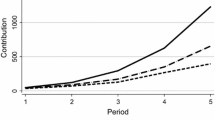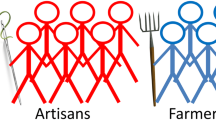Abstract
We perform an experiment which provides a laboratory replica of some important features of the welfare state. In the experiment, all individuals in a group decide whether to make a costly effort, which produces a random (independent) outcome for each one of them. The group members then vote on whether to redistribute the resulting and commonly known total sum of earnings equally amongst themselves. This game has two equilibria, if played once. In one of them, all players make effort and there is little redistribution. In the other one, there is no effort and nothing to redistribute. A solution to the repeated game allows for redistribution and high effort, sustained by the threat to revert to the worst of these equilibria. Our results show that redistribution with high effort is not sustainable. The main reason for the absence of redistribution is that rich agents do not act differently depending on whether the poor have worked hard or not. The equilibrium in which redistribution may be sustained by the threat of punishing the poor if they do not exert effort is not observed in the experiment. Thus, the explanation of the behavior of the subjects lies in Hobbes, not in Rousseau.
Similar content being viewed by others
References
Acemoglu, D., & Robinson, J. (2000). Why did the west extend the franchise? Democracy, inequality, and growth in historical perspective. The Quarterly Journal of Economics, 115(4), 1167–1199.
Alesina, A., & Angeletos, G.-M. (2005). Fairness and redistribution. American Economic Review, 95, 960–980.
Atkinson, A. B. (1995). The welfare state and economic performance. National Tax Journal, 48, 171–198.
Attanasio, O., Banks, J., & Tanner, S. (2002). Asset holding and consumption volatility. Journal of Political Economy, 110(4), 771–792.
Berninghaus, S. K., & Ehrhart, K. M. (1998). Time horizon and equilibrium selection in Tacit coordination games: experimental results. Journal of Economic Behavior & Organization, 37, 231–248.
Binmore, K. (1998). Just playing: game theory and the social contract II. Cambridge: MIT Press.
Bolton, G., & Ockenfels, A. (2000). ERC: a theory of equity, reciprocity, and competition. American Economic Review, 90, 166–193.
Fehr, E., & Schmidt, K. M. (1999). A theory of fairness, competition and cooperation. The Quarterly Journal of Economics, 114, 817–868.
Fiorina, M. P., & Plott, C. R. (1978). Committee decisions under majority rule: an experimental study. The American Political Science Review, 72, 575–598.
Fischbacher, U. (2007). z-Tree: Zurich toolbox for ready-made economic experiments. Experimental Economics, 10, 171–178.
Frohlich, N., & Oppenheimer, J. A. (1990). Choosing justice in experimental democracies with production. The American Political Science Review, 84, 461–477.
Hassler, J., Rodríguez Mora, J. V., Storesletten, K., & Zilibotti, F. (2003). The survival of the welfare state. American Economic Review, 93, 1–26.
Hoffman, E., & Spitzer, M. L. (1985). Entitlements, rights and fairness: an experimental examination of subjects’ concepts of distributive justice. Journal of Legal Studies, 14, 259–297.
Lindbeck, A., Nyberg, S., & Weibull, J. (1999). Social norms and economic incentives in the welfare state. The Quarterly Journal of Economics, 114, 1–35.
Moller, S., Huber, E., Stephens, J. D., Bradley, D., & Nielsen, F. (2003). Determinants of relative poverty in advanced capitalist democracies. American Sociological Review, 68, 22–51.
Ochs, J. (1995). Coordination problems. In A. Roth & J. Kagel (Eds.), Handbook of experimental economics. Princeton: Princeton University Press.
Plott, C. R. (1982). Industrial organization theory and experimental economics. Journal of Economic Literature, 20, 1485–1527.
Porteous, D. (1783). A letter to the citizens of Glasgow. Glasgow: Robert Chapman, Alexander Duncan (p. 12).
Schram, A. (2005). Artificiality: the tension between internal and external validity in economic experiments. Journal of Economic Methodology, 12, 225–238.
Schram, A., & Sonnemans, J. (1996). Why people vote: experimental evidence. Journal of Economic Psychology, 17, 417–442.
Sutter, M. (2002). Public bad prevention by majority voting on redistribution: experimental evidence group decision and negotiation. Group Decision and Negotiation, 11, 415–428.
Sutter, M., Kocher, M. G., & Haigner, S. (2010). Choosing the stick or the carrot? Endogenous institutional choice in social dilemma situations. Review of Economic Studies, 77, 1540–1566.
Sutter, M., & Weck-Hannemann, H. (2004). An experimental test of the public-goods crowding-out hypothesis when taxation is endogenous. FinanzArchiv: Public Finance Analysis, 60, 94–110.
Tyran, J.-R., & Sausgruber, R. (2006). A little fairness may induce a lot of redistribution in democracy. European Economic Review, 50, 469–485.
Van Huyck, J. B., Battalio, R. C., & Beil, R. O. (1990). Tacit coordination games, strategic uncertainty, and coordination failure. American Economic Review, 80, 234–248.
Author information
Authors and Affiliations
Corresponding author
Additional information
We thank Iris Bohnet, Tim Cason, David Cooper, John Duffy, Maia Guell, John Van Huyck and Robin Mason for helpful conversations and encouragement. The comments of the Editor and two referees helped improve the paper. We gratefully acknowledge the financial support from Spain’s Ministry of Science and Innovation under grants CONSOLIDER INGENIO 2010 CSD2006-0016 (all authors), ECO2009-10531 (Cabrales), ECO2008-01768 (Nagel) and the Comunidad de Madrid under grant Excelecon (Cabrales), the Generalitat de Catalunya and the CREA program (Nagel), and project SEJ2007-64340 of Spain’s Ministerio de Educación y Ciencia (Rodríguez Mora).
Electronic Supplementary Material
Below is the link to the electronic supplementary material.
Rights and permissions
About this article
Cite this article
Cabrales, A., Nagel, R. & Rodríguez Mora, J.V. It is Hobbes, not Rousseau: an experiment on voting and redistribution. Exp Econ 15, 278–308 (2012). https://doi.org/10.1007/s10683-011-9300-x
Received:
Accepted:
Published:
Issue Date:
DOI: https://doi.org/10.1007/s10683-011-9300-x




